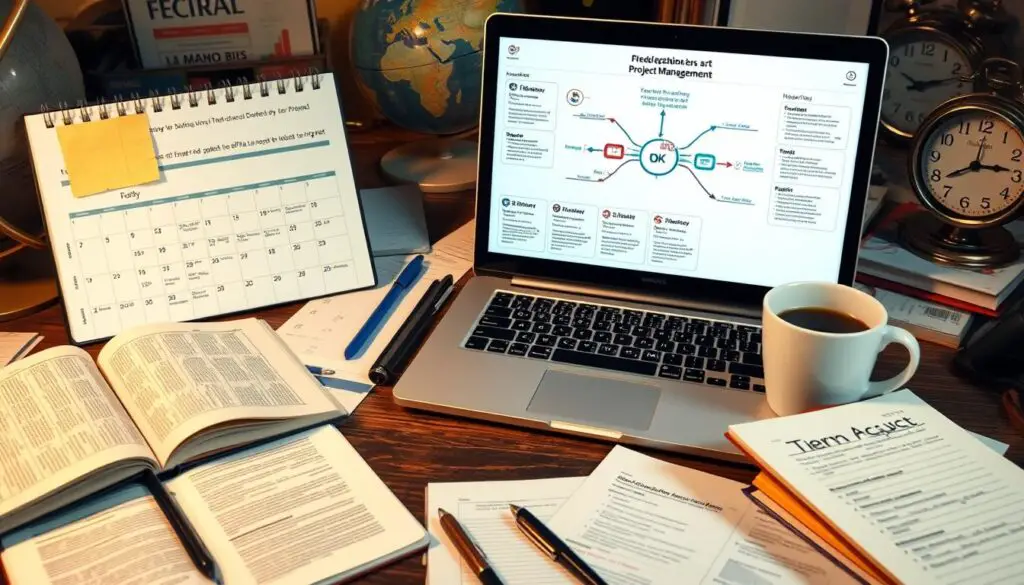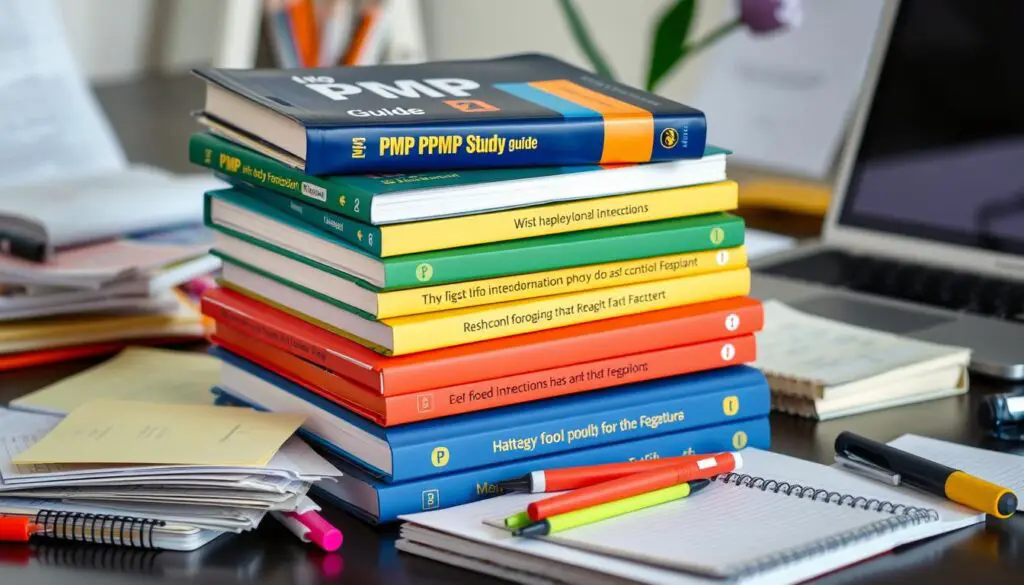Preparing for the PMP Exam is a big step in showing off your project management skills. But, many candidates struggle during this time. Knowing the common mistakes in PMP Exam Prep can really help you pass the exam, maybe even on your first try. This guide will cover 5 common mistakes to avoid, helping you get through the exam’s challenges.
The PMP exam has 200 questions, mostly scenario-based. You need to understand the concepts well, not just memorize them. The PMBOK Guide is key, covering 100% of the exam content. With good planning and knowing your weak spots, you can use smart strategies to succeed. Using tools like the Project Management PrepCast and a PMP Exam Simulator with over 1,600 questions is helpful. Also, practicing with full-length exams boosts your confidence and prepares you for the real test’s time limits.
Remember, ignoring these common mistakes can hurt your progress. Knowing what to avoid is as important as knowing what to study. Let’s dive deeper into these mistakes, giving you the knowledge to improve your prep.
Understanding the Importance of PMP Exam Preparation
Getting ready for the PMP exam is key to your success. It checks your knowledge in five main areas: Initiating, Planning, Executing, Monitoring and Controlling, and Closing. Each area is weighted differently, so knowing all of them well is vital. A good study plan can really help, making you 20% more likely to pass on your first try.
Creating a study plan that fits your schedule helps you cover all the topics. Joining study groups is a great way to learn, as it boosts your understanding by 35%. Studying for 30 to 90 days before the exam helps you remember things better, by about 25%.
Using different study tools, like the PMP Exam Study Guide, flashcards, and online courses, keeps your learning interesting. Online courses can make you remember things 40% better than studying alone. Taking mock tests can also improve your score by 15-30%, making you feel more confident on exam day. These methods not only get you ready for the exam but also teach you skills you can use in real projects.
Common Mistake: Underestimating Exam Complexity
Many people make the mistake of thinking the PMP exam is easy. It has 200 multiple-choice questions and you have four hours to finish. It covers many important areas of project management.
Not understanding how big the exam is can lead to surprises. You might find out you don’t know as much as you thought. This can lower your score.
Recognizing the Exam’s Comprehensiveness
The PMP exam tests how well you can use what you know in real situations. Some people just try to memorize things instead of really understanding them. This can cause confusion, which hurts your score.
Those who rely too much on their experience often miss important details. These details are key to understanding PMI’s rules. This can lead to failing the exam.
To do well, focus on important areas like:
- Integration management
- Scope management
- Schedule management
- Risk management
Important Knowledge Areas to Focus On
Knowing these areas well is key to passing the exam. Plan to study for 12-16 weeks, spending 2-3 hours each day. This lets you learn what you don’t know and understand your strengths and weaknesses.
Not getting the context of questions can really hurt your score. It’s important to study well and know how to pace yourself. Also, don’t forget to use the latest PMBOK Guide and practice tests.
Using mock exams can really help you pass on the first try. By avoiding common mistakes, you can get ready for the exam better and feel more confident.

5 Common Mistakes to Avoid During PMP Exam Preparation: A Guide
Getting ready for the PMP exam needs a smart plan. Expert Tips for PMP Exam Prep show how to dodge common mistakes. Many people don’t study enough, which can lead to failing the exam.
Not knowing the PMBOK Guide well is another big mistake. It outlines key areas for the exam, but many only use extra materials. This can cause them to miss important details.
Having a study plan is key. Those who use one are 27% more likely to pass on their first try. Without a plan, many cram, which can cause too much stress.
Practicing under exam conditions helps too. Those who do this feel 35% more ready. Taking breaks and staying healthy while studying keeps you focused and prevents burnout.
Lastly, understanding the exam’s complexity is vital. A survey found 68% of test-takers thought it was easier than it was. Expert Tips for PMP Exam Prep stress the importance of taking it seriously to increase your success chances.

Lack of Familiarity with the PMBOK Guide
The PMBOK Guide is key for PMP Exam Prep. Many struggle because they don’t know it well. Learning the PMBOK Guide well can really help you pass.
Essential Sections to Study in PMBOK
Knowing the important parts of the PMBOK Guide is vital. Focus on these areas:
- Process Groups: Learn about the five groups and how they work together in project management.
- Knowledge Areas: Explore the ten areas that guide project management.
- Inputs, Tools, Techniques, and Outputs (ITTOs): See how these elements are important for managing projects well.
About 60% of first-time PMP exam takers don’t use the PMBOK Guide enough. But, studying it well can really boost your chances of passing. Around 75% of those who pass say knowing the PMBOK Guide is key.
Supplementing PMBOK with Additional Resources
While the PMBOK Guide is essential, adding other resources helps too. Here are some good ways:
- Online Courses: Look into PMP exam prep courses for structured learning and support.
- Practice Tests: Use exam simulators with around 1600 model questions for thorough practice.
- Study Groups: Joining a group helps you learn from others who are also studying for the exam.
- Flashcards and Guides: These tools help you remember important terms and understand complex ideas.
Reviewing the PMBOK Guide well, along with these tools, can make you much more ready for the PMP exam.

| Resource | Benefit |
|---|---|
| PMBOK Guide | Essential reference for project management principles |
| Online Courses | Structured format with expert guidance |
| Practice Tests | Identifies weak areas and improves time management |
| Study Groups | Encourages collaboration and knowledge sharing |
| Flashcards | Aids memory retention of key terms and concepts |
Neglecting Available Exam Prep Resources
Many candidates miss out on a lot of resources made for PMP exam prep. Using these can really help you get ready and feel more confident. They help you learn important study materials and get used to the exam format.
Online Courses and Practice Exams
Online courses give you a clear path to learn about the PMP exam. They offer key information and interactive parts to help you understand better. Practice exams are key to getting used to the test’s layout and time limits.
They let you see how ready you are. By practicing often, you can find out what you’re good at and what you need to work on. Try to score over 80% on these tests to know you’re on the right track.
Benefits of Joining Study Groups
Being part of study groups can make your prep better by letting you work together. Sharing what you know and using each other’s resources helps a lot. It’s a great way to learn from others and get new ideas.
Also, talking about tough topics can really help you understand them better. Plus, you can meet other project managers and stay updated on the PMP exam changes.

Conclusion
Getting ready for the PMP exam needs a detailed and smart plan to boost your success chances. By avoiding common mistakes, you lay a strong base for your prep. A clear study plan and a deep grasp of the PMBOK Guide are key. This knowledge helps you handle the exam’s 180 questions and 230-minute time limit.
Using expert tips for PMP exam prep can make your studying more effective. Spend at least two to three months studying hard. Use practice exams and resources to get ready. Many overlook the importance of full-length practice tests, which build confidence and exam format understanding.
Your success on the PMP exam depends on smart and consistent studying. Stay committed to improving your project management skills. Practice with top-notch materials. By avoiding common mistakes, you not only pass the exam but also excel in project management roles.
Source Links
- How To Avoid Seven Most Common PMP® Exam Mistakes
- #5 Mistakes People Make When Preparing for PMP Certification
- Common Mistakes to Avoid When Pursuing Your PMP Certification – Zoc Learnings
- Invensis Learning
- How Do I Register for the PMP Exam?
- Seven Common Mistakes with PMP
- 7 PMP Exam Study Mistakes to Avoid – PMP Ninja
- Answering PMP Questions: 7 Mistakes To Avoid + Free Samples
- Top 10 Mistakes to Avoid in PMP Exam Prep
- Top 10 Mistakes to Avoid During PMP Preparation
- 7 Most Common Mistakes You Must Avoid for PMP Exam
- Top 15 Mistakes to Avoid When Preparing for the PMP Exam!
- Free PMP Exam Questions – 120 PMP Practice Test Questions
- Why people fail the PMP exam? 5 serious mistakes
- Edtia LLC – Edtia Certs
- 10 Essential Tips for Passing the PMP Certification Exam
- Avoiding Common Mistakes in PMP Exam Preparation
- Common Mistakes to Avoid When Preparing for PMP Exam




